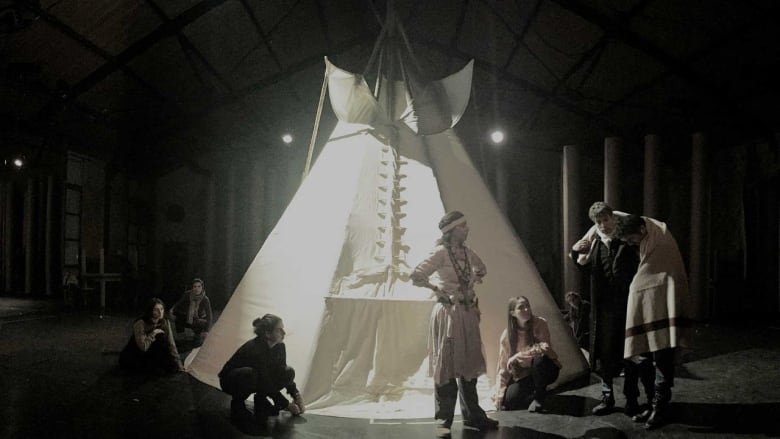Robert Lepage cancels Kanata show after co-producers withdraw support
Opposition politicians call the decision an attack on artistic freedom of expression

Quebec director Robert Lepage's new theatre production has been cancelled.
The decision to cancel Kanata, a show that explores Canada's settler history, comes after some of the North American co-producers withdrew from the project, Lepage's production company, Ex Machina, said in a statement Thursday morning.
Indigenous writers, actors and community activists raised concerns this month about the lack of Indigenous artists in the play, which was meant to be staged at the Théâtre du Soleil in Paris in December.
'Hearing other people tell our stories'
A group of them released an open letter criticizing the production, saying they were tired "of hearing other people tell our stories."
They said they wanted to see Indigenous performers included in the show.
As a result of the letter, 34 of the Indigenous activists who signed it sat down last week with Lepage and Ariane Mnouchkine, whose Paris-based theatre company was putting on the play, to discuss their concerns.
Some of the activists emerged from the six-hour meeting saying Lepage had done little to address the issues, however.
Nakuset, the executive director of Montreal's Native Women's Shelter, who attended the meeting, said she welcomed the play's cancellation.
While Lepage's team said the decision was made because financial backers withdrew, Nakuset said that was good enough.
"I'm thrilled that somebody got it. That's what we wanted. We wanted someone's light bulb to go off.… Apparently, it wasn't Robert Lepage's team, but the end result is we don't have to worry about this play damaging our history," she told CBC News.
"And maybe there's an opportunity in the future to work with him, where we are truly working with him."
In its statement, Ex Machina said a discussion about cultural appropriation needs to take place.
"Beyond this troubling situation, sooner or later we will need to try to understand — calmly and together — what cultural appropriation and the right to free artistic expression fundamentally are."

Earlier Lepage production dropped from Jazz Fest
The cancellation of Kanata comes after another Lepage production, SLĀV, was dropped by the Montreal International Jazz Festival after being accused of cultural appropriation.
That show, performed by singer Betty Bonifassi and directed by Lepage, both of whom are white, featured African-American slave songs.
Ex Machina said it plans to meet with critics of SLĀV this fall.
The show will be staged in other Quebec cities later this year.
Quebec politicians weigh in
With a provincial election in Quebec just over two months away, the issue is reverberating in political circles.
Jean-François Lisée, leader of the Opposition Parti Québécois, tweeted his support for Lepage Thursday.
2/2 Les pressions des censeurs et la faiblesse morale des coproducteurs ne doivent pas avoir le dernier mot en matière de liberté artistique. Le débat, oui. Le soutien à davantage de diversité dans les arts, absolument. Le recul des libertés, jamais ! <a href="https://twitter.com/Ex_M?ref_src=twsrc%5Etfw">@Ex_M</a> <a href="https://twitter.com/hashtag/polqc?src=hash&ref_src=twsrc%5Etfw">#polqc</a> <a href="https://twitter.com/hashtag/slav?src=hash&ref_src=twsrc%5Etfw">#slav</a> <a href="https://twitter.com/hashtag/kanata?src=hash&ref_src=twsrc%5Etfw">#kanata</a> <a href="https://t.co/WJJjwbCV2M">pic.twitter.com/WJJjwbCV2M</a>
—@JFLiseeLisée called on Liberal Premier Philippe Couillard to support the production.
"Support for more diversity in the arts, absolutely," Lisée tweeted. "The retreat of freedoms, never!"
The Coalition Avenir Québec (CAQ), which has put identity politics front and centre in the months leading up to the electoral campaign, calls Ex Machina's decision to cancel Kanata "regrettable."
"As with the cancellation of SLĀV, we fear that this threatens the freedom of expression of our artists," a CAQ spokesperson said in a statement. "We have to be able to conduct these important societal debates in an atmosphere of calm and respect."
'Nobody wins here'
Culture Minister Marie Montpetit called Kanata's cancellation "unfortunate" and a missed opportunity to talk about Indigenous culture. However, she said, the events of the last few weeks were a reminder of the importance of openness and dialogue.
"Nobody wins here: not the creators, nor the Indigenous nations, nor the public," said Montpetit.
This type of outcome must be prevented in the future, she said, citing the new provincial cultural policy introduced last June, which she says supports measures to ensure inclusion and more contributions from diverse elements of society.
"We have always supported the work of Mr. Lepage," Montpetit said. "Mr. Lepage has made a decision, and we will let him comment for the future."
Gabriel Nadeau-Dubois, the co-spokesperson for the left-leaning Québec Solidaire (QS), said the Kanata controversy shows the need for public discussion on the place of minorities and Indigenous people in the cultural sphere.
"There is certainly a way to reconcile the essential creative freedom and the need to increase minority representation so they can be involved in works of art that discuss their realities or their histories," Nadeau-Dubois said.
Rather than cancelling the play, QS would have suggested continuing the dialogue, he said.
"That being said, it's not up to political parties to decide on the programming of Quebec theatres."
'Dead silence' from Union des Artistes
Journal de Montréal columnist Josée Legault called Lepage "the most universalist artist in Quebec," expressing dismay that "these two very important plays" should be cancelled "due to political pressure from a few interest groups."
"These two plays weren't against the black community or against the Aboriginals," said Legault in an interview with CBC News.
She said she was also disturbed by "the dead silence" from Quebec's Union des Artistes.
"They should have defended this freedom of expression on the part of one of our most respected artists in the world," Legault said. "Even if it had been a lesser known artist, it's the same principle that applies."
Legault also expressed her disappointment at Canada Council for the Arts' decision to reject a grant application to fund Kanata in 2016.
Radio-Canada reported Wednesday that the council turned down the request to fund Lepage's project because it did not involve any Aboriginal collaborators at the time of the application.
With files from Matt D'Amours, Nancy Wood and Jennifer Yoon